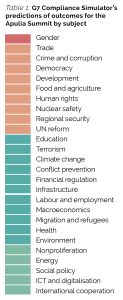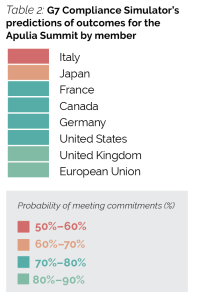AI predictions on G7 commitments
Artificial intelligence tools with predictive capabilities have the potential to amplify the influence of the G7, more effectively positioning the group to strategically address global challenges
For five decades, the G7 has functioned as a global platform advocating the liberal and democratic values upheld by its members. During this time, its annual summit has produced more than 6,000 commitments to address various challenges, including development, climate change, health and financial regulation. Despite these efforts, historical records show that only 62% of these commitments have been completely fulfilled in the year after they were made. For the G7 to achieve its goals, it is crucial that members adhere to the commitments they make.
Predicting compliance using artificial intelligence
The G7 Research Group has collected data on commitment outcomes that make it possible to produce, using artificial intelligence, data-driven estimates of the probability that each G7 member will fulfil commitments made at the summits. The G7 Compliance Simulator is a random forest-based machine learning model that uses historical G7 commitment and compliance performance, details about G7 ministerial meetings, economic conditions, the focus of summit commitments, the host country of the summit and specific attributes of the commitments themselves to make reasonably accurate predictions (with 88% accuracy) about how likely G7 members are to meet the commitments made at the summits. It is freely available online. These predictions can enable summit attention to focus on highly important commitments that are at risk of not being fully or adequately met.
In the lead-up to and during G7 summits, leaders often grapple with intricate decisions within tight timeframes. Predictive AI offers real-time decision support by continually analysing the evolving dynamics of discussions and commitments. By forecasting the likelihood of commitment fulfillment for each member, these institutions can optimise resource allocation for maximal impact on global goals. Leveraging the G7 Compliance Simulator enables summit organisers to promptly identify commitments most at risk of non-fulfillment and members with higher likelihoods of non-compliance. This facilitates real-time adjustments during gatherings, allowing leaders to allocate additional discussion and efforts to strategise ways to meet these commitments.
Predicting outcomes for the 2024 Apulia Summit
Table 1 shows the G7 Compliance Simulator’s predictions of outcomes for the Apulia Summit by subject. These predictions are based only on scheduled ministerial meetings and subjects for the commitments, as the specific content of the summit commitments is not available until after the summit itself. On the eve of the summit, commitments on gender are predicted to have the worst outcomes, and commitments on trade, crime and corruption, democracy, development, food and agriculture, human rights, nuclear safety, regional security and reform of the United Nations are predicted to have subpar performance. Similarly, Table 2 shows the G7 Compliance Simulator’s general predictions of outcomes for the Apulia Summit by member. Italy and Japan are predicted to be the least likely to meet their commitments.


These predictions are not intended to cast a negative judgement on members deemed at risk of not fulfilling their commitments. Rather, these assessments rely on historical trends observed in adhering to commitments made at G7 summits. In fact, highlighting members with historically lower compliance rates as at risk might even serve as a catalyst for directing resources to support their improvement.
Conclusion
AI tools with predictive capabilities, like the G7 Compliance Simulator, have the potential to amplify the influence of the G7. By promptly identifying high-risk commitments through real-time prediction of outcomes during summits, these tools enable targeted resource allocation to areas with lower predicted success probabilities. With the integration of predictive AI, G7 summits can be more effectively positioned to address global challenges strategically. Note: The compliance simulator can be accessed at g7-utoronto.ca/shinyapps.io/compliance-tool/. Full data and code are available at github.com/rapsoj/g7-compliance.












